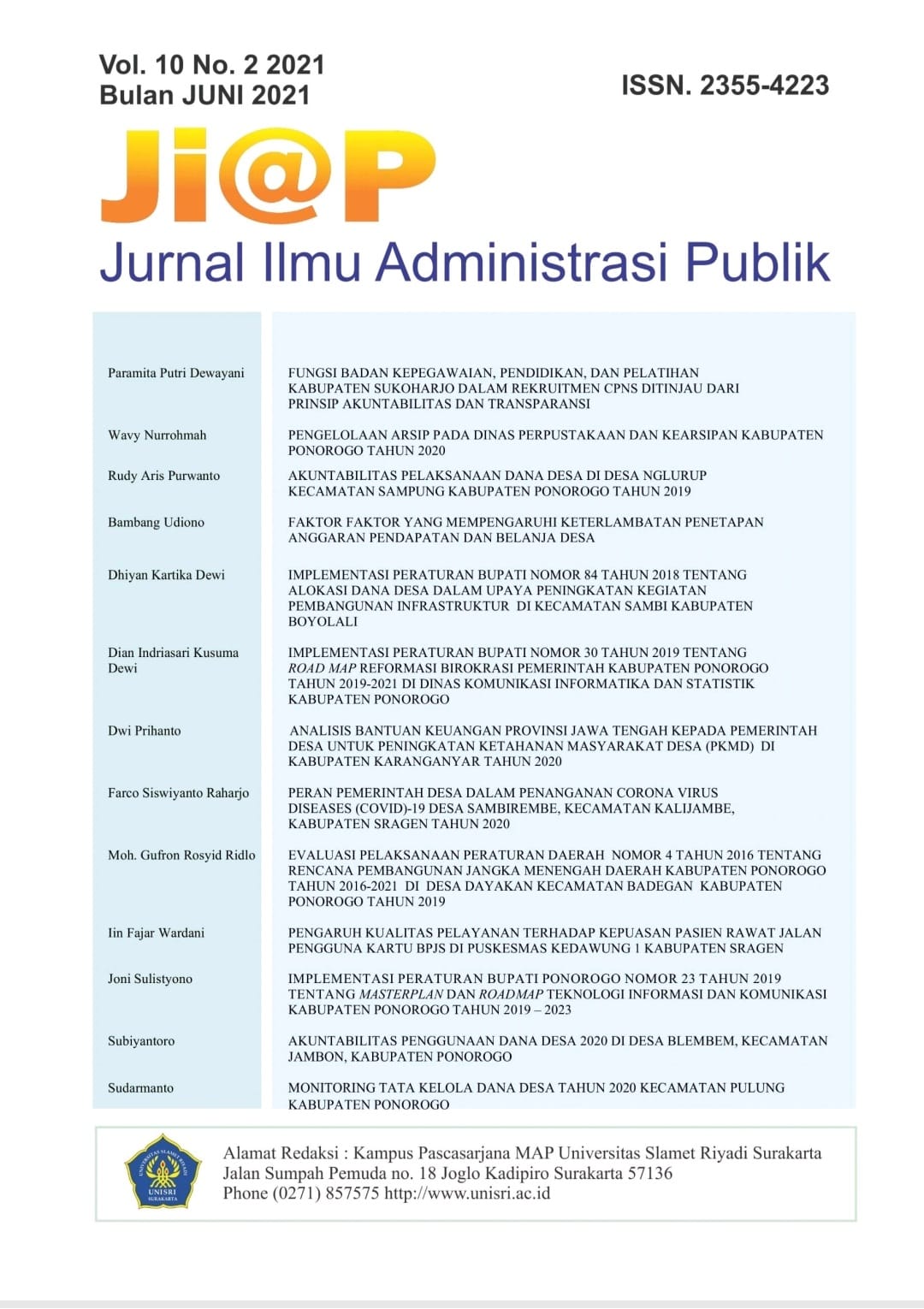IMPLEMENTASI PERATURAN BUPATI NOMOR 84 TAHUN 2018 TENTANG ALOKASI DANA DESA DALAM UPAYA PENINGKATAN KEGIATAN PEMBANGUNAN INFRASTRUKTUR DI KECAMATAN SAMBI KABUPATEN BOYOLALI
DOI:
https://doi.org/10.33061/jp.v10i2.5902Keywords:
Implementation, Village Fund, InfrastructureAbstract
The village government as the lowest layer of government directly facing the
community is required to hold an effective government and plan development
well.The obstacle faced by the village government in Sambi sub-district is the role
of the community in infrastructure development, the village government is less
expert at compiling village documents.The method used in this study is descriptive
qualitative by using the theory of policy implementation put forward by Goerge
Edward III where variables that determine the effectiveness of implementation are
communication, resources, disposition and bureaucratic structure.The
implementation of village funds in infrastructure development in Sambi Subdistrict, on communication indicators has been good, where the village government
held a village development before village funds were implemented to build
infrastructure. People give opinions in the musrenbangdes.Indicators of village
device resources in the village government need to receive guidance and direction
in implementing this village fund.Human resources in the community are adequate
because many people already have the title of S-1.Indicators of disposition include
commitment, nature of democracy, honesty, attitude of implementors have been
very good in implementing village funds according to Perbup No. 84 of 2018 by
carrying out development and accountable administratively.Indikaktor
Bureaucratic structure in the formation of bureaucratic structure of village fund
implementation has not been in accordance with the toxic.
Keywords: Implementation, Village Fund, Infrastructure
References
Adriana Ida Ndapa. (2015). Implementasi kebijakan Alokasi Dana Desa Dalam Meningkatkan Pemyelenggaraan Pemerintah daerah ( studi Kasus Kecamatan Kanantang, Kabupaten Sumba Timur)
Agustino, Leo. 2008. Dasar-Dasar Kebijakan Publik, Bandung: Alfabeta
Dunn, William N. (2003). Analisis Kebijakan Publik. Yogyakarta: Gadjah Mada University Press.
Dunn, William N. 1999. Analisis Kebijakan Publik, Yogyakarta : Gadjah Mada University Press
Edward III, George C. 1980. Implementing Public Policy. Washington DC: Congresional Quarterly Press
Kodoatie, Robert J dan Roestam Sjarief. 2010. Tata Ruang Air. Yogyakarta: Andi. Singarimbun, Masri dan Efendi Sofian. 1997. Metode Penelitian Survey. Jakarta: LP3S.
Moh. Nazir. 2009. Metode Penelitian. Jakarta: Ghalia Indonesia
Peraturan Menteri Dalam Negeri No 113 Tahun 2014 Tentang Pengelolaan Keuangan Desa
Peraturan Menteri Dalam Negeri Nomor 114 Tahun 2014 Pedoman Pembangunan Desa.
Peraturan Pemerintahan Nomor 60 Tahun 2014 Tentang Dana Desa
Robert J. Kodoatie. 2003. Pengantar Manajemen Infrastruktur Bandung: PT. Remaja Rosdakarya.
Setiawan, Guntur. (2004). Implementasi dalam Birokrasi Pembangunan. Bandung Remaja Rosdakarya Offset
Sugiyono,2012 Metodologi Penelitian Bisnis, Bandung: Alfabeta
Sugiyono. 2011. Metode Penelitian Kuantitatif Kualitatif dan R&D. Bandung: Alfabeta.
Undang-Undang Nomor 6 Tahun 2014 Tentang Desa
Usman & Nurdin. (2002). Konteks Implementasi Berbasis Kurikulum. Jakarta
Downloads
Published
How to Cite
Issue
Section
License
Copyright (c) 2021 Dhiyan Kartika Dewi

This work is licensed under a Creative Commons Attribution-NonCommercial 4.0 International License.
Authors who publish this journal agree to the following terms:
- Authors retain copyright and grant the journal right of first publication with the work simultaneously licensed under a Creative Commons Attribution License that allows others to share the work with an acknowledgement of the work's authorship and initial publication in this journal.
- Authors can separately make additional contractual arrangements for non-exclusive distribution published by the journal (e.g., publish it in a book), with an acknowledgement of its initial publication in this journal.
- Authors are allowed and encouraged to send their work via online (e.g., in the institutional repositories or their website) after published by the journal.













